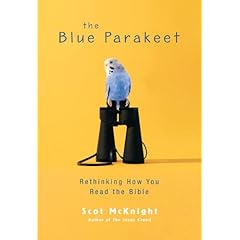Recently, a good friend complained to me that a particular Bible discussion didn't help to clarify the particular issue in his mind. He said, "I walked a way less sure and more confused." My response was "good."
Over the recent years I have become more comfortable with the idea that God is too big for us to know with clarity. Without a doubt, we are to strive each day to know him better than the last day. We are to study his word (the Bible), listen to expert comentaries, and discuss it in faithful groups of Christians. These are important steps for the follower of Christ and will facilitate spiritual growth.
We cannot expect that Christian growth means that we are less confused, that we know God more perfectly, or that our study will raise much of anything but more questions. Karl Barth (pronounced bart), a Swiss, Neo-orthodox theologian who valiantly battle liberal theology in the early to mid-1900s, called this dialectical theology because he believed that too much of God was paradoxical and unknowable to the human. Barth's point was that the best answer to a theological question was the next best question.
This brings me to my book review on Scot McKnight's The Blue Parakeet (Zondervan, 2008, 240 pages). (I provided this link for your convenience should you like to read the book. I read the Kindle version.) McKnight is a thoughtful, seasoned Bible scholar who teaches at North Park University in Chicago. In The Blue Parakeet, McKight examines how we should read the Bible, particularly the difficult passages. I'll let you read the book to discover why it is named so.
McKnight, by his own reasoning, is an evangelical scholar. There are many with a more narrow interpretation of evangelical who wouldn't agree, because many evangelicals will only identify with others who subscribe to specific set of doctrine. This doctrine is often narrow in interpretation and broad in scope.
One point that many evangelicals will struggle with the Blue Parakeet and McKnight, is that he is in many way post-modern. He makes a strong argument that the Bible must be read as a story (not a fiction story) and applied according to the context of the reader. He argues that too many want to read the Bible as a list of laws, morsels of blessings, an psychological inkblot, a puzzle, or examples of Maestros. I will let McKnight explain those.
McKnight, on the other hand, believe the Bible is God's story from begining to end, with each book being the author's telling of the story at a particular time to a particular people. The challenge then is to read the Bible with an understanding of that time and people, and learn what that means to today and to the people you live among. This is not easy. It is more work than the other ways we can read the Bible. It also means that two people in two different places may draw different interpretations, particularly with respect to a passage's application.
At this point, I'm sure that many of my Christian friends are getting uncomfortable. That is alright. I was too, and I think that it is that discomfort that drove me to read the rest of the Blue Parakeet with an open, but discerning mind. In the end, discernment is the crux of McKnight's book. Everything in the Bible must be discerned with the Holy Spirit and nothing is settled.
This post is already too long, but there is more I would like to say about these matter. I hope to do so in other posts. Let me just conclude by saying that as I read the Blue Parakeet, I felt uncomfortable. I still do not agree with every point he makes, but I can tell you that I also began asking a lot more questions about my God, myself and my understanding of what it means to know God. I was driven deeper into my Bible, and, while I developed more questions, I believe that the depth of my questions is growing. I believe this book has helped me to grow as a believer, too.

